America's troubled history in Afghanistan
The Miller Center's George W. Bush oral history reveals much about the origins of U.S. policy
The history of American engagement in Afghanistan has taken on renewed importance with the fall of that country back to the Taliban. What decisions made by American policymakers led to this result? Was it inevitable, or were there missed opportunities that might have created the conditions for long-term success?
American forces entered that country—until then a safe haven for al Qaeda—in the immediate aftermath of the September 11 attacks on the orders of President George W. Bush. The Miller Center’s White House oral history interviews include extensive discussions about the major policy decisions on Afghanistan and how those decisions were viewed and executed by senior diplomats and American military leaders. Many of the Center’s interviews with Bush administration officials have already been opened to the public, and they form one of the core resources used by Washington Post journalist Craig Whitlock in his new book The Afghanistan Papers: A Secret History of the War (Simon & Schuster).
The entirety of those oral histories can be read on the Miller Center’s website, revealing the complexities of decision-making about Afghanistan. (On-going interview projects on Presidents Obama and Trump will complete the picture.)
Six Bush 43 interviews in particular give especially detailed portraiture of American efforts in that country during those years.
![Ryan Crocker at the Miller Center]() Ambassador Ryan Crocker speaks extensively about the situation in-country in Afghanistan (and in the broader region), as one of the nation’s most experienced diplomats
Ambassador Ryan Crocker speaks extensively about the situation in-country in Afghanistan (and in the broader region), as one of the nation’s most experienced diplomats
The devastation in Afghanistan at the end of ’01, beginning of ’02, was almost absolute. Just driving in from Bagram to Kabul, not a building standing, bridges out, we had to ford a river, whole city blocks of Kabul were gone. It looked like pictures of Berlin in 1945.
Karzai had nothing. No infrastructure, no bureaucracy, no security forces. Just a cold, drafty palace to try and preside over.
This was not because of us. It wasn’t because of the Taliban. It was a result of the Afghan civil war in the 1990s. But it meant that [Hamid] Karzai had nothing. No infrastructure, no bureaucracy, no security forces. Just a cold, drafty palace to try and preside over.
And it was working with him trying to identify people who could help him. Afghan-Europeans, Afghan-Americans, the experience there is what gave rise to the Future of Iraq project. How much nicer it would have been if we had a cadre of Afghan expatriates already identified, who could have been brought in after the fall of the Taliban.
[A] clear imperative was asserting right from the beginning, “We are not an occupying power.” That was the importance of the Bonn Conferences, the UN-brokered formation of the Afghan Interim Authority, a fully sovereign authority at least in name.
Avoiding the appearance and the reality of unilateralism. Not the Americans calling the shots. It all goes through Karzai. And to ensure we were all sending that signal, hence the importance of the relationship with General McColl. He and I, it’s kind of interesting because it’s what [David] Petraeus and I did later in Iraq. We would normally go see—my breakfasts were separate but McColl and I, a couple of times a week, would go together to see Karzai. Military-civilian, American and international, in support of an Afghan authority. Trying to avoid the narrative of another Western occupation of Afghanistan from taking hold.
We could not be styled as occupiers, yet we had to have enough leverage to prevent really bad things from happening. And we saw that contradiction play out fairly early on.
And, in an ironic way, the very small force footprint we had at that time actually assisted in that, because you didn’t have American soldiers on every street corner. It was this careful balance. We could not be styled as occupiers, yet we had to have enough leverage to prevent really bad things from happening. And we saw that contradiction play out fairly early on.
My strong sense, based on my experience there, was that there wasn’t a great deal of high-level interest anywhere in Washington as to what happened next in Afghanistan. We had gotten rid of the Taliban. We had answered 9/11. DoD in particular absolutely did not want to see us get involved in nation building, hence the total economy-of-force effort. We had knocked off the bad guys. We had paid back for 9/11. Our work there basically was done.
![Douglas Feith headshot]() Douglas Feith, one of Defense Secretary Donald Rumsfeld’s most trusted aides, was involved from the earliest days in shaping defense policy on Afghanistan
Douglas Feith, one of Defense Secretary Donald Rumsfeld’s most trusted aides, was involved from the earliest days in shaping defense policy on Afghanistan
In Afghanistan we took what was called the "lead nation approach" to reconstruction. This was an idea promoted by the UN. It was supported by the U.S. government. Major sectors in reconstruction were assigned to different countries. Police training was assigned to the Germans. Security forces were assigned to the United States. Disarmament and reintegration of militias were assigned to Japan. The judiciary was assigned to Italy--go figure. Counternarcotics was assigned to the British. This was called the lead nation approach.
The idea was that these were all supposed to be multilateral efforts, but for each there was a lead country. It didn't work. What happened was the United States put substantial resources into its area of responsibility and did a reasonably good job. The British put some resources, but not enough, into the counternarcotics efforts.
The Germans accepted the police training, which in Afghanistan required starting at square one, including officers, interior ministry people, forensics people. You needed everything. The Germans came in and said, "We're going to fulfill our responsibility by building an academy to train police officers. Not the patrol guys, but the officers. We're going to build the academy. It's going to take a few years." What's supposed to happen in the meantime? The Germans basically redefined their responsibility to being a thin slice of what needed to be done, and then they didn't do much even to do the thin slice.
This was an example of leaving important tasks to the "international community" and not a lot happened.
I don't want to be overly harsh on the allies. These were at least people who were willing to do something. There were allies who didn't want to do anything. I'm not saying this to mock or knock the allies, but it tells us about the pitfalls of multilateralism. This is a lot harder to do than is understood by people who say that the United States is just stupidly arrogant when we assert that if there is no U.S. leadership, nothing gets done. This was an example of leaving important tasks to the "international community" and not a lot happened.
As for the Italians, who were responsible for the judiciary, after something like two years, they had not even assigned a single person full time to the job. I personally went over and spoke to their National Security Advisor and said, "One person, full time, would be an improvement." It was unbelievable, the negligence on these various projects.
Rumsfeld said something like, "You see how we did it in Afghanistan? We can't do it that way. If you're not going to do it on the lead nation concept and the United States is clearly going to be responsible, and you're not going to separate civilian and security reconstruction, so the same person has to be responsible for the military efforts and the nonmilitary efforts. Statutorily there are only two people in the whole U.S. government who are allowed to give orders to the military, and those are the President and the Secretary of Defense. By a rather easy logical process, the person who has to be responsible is me." "Me" being Rumsfeld.
In Afghanistan there was enormous frustration in the first days. We had no war plan on the shelf for Afghanistan. Nobody anticipated that we were going to go to war in a landlocked country in the middle of central Asia. We got hit on 9/11 and we started the war on October 7th, less than a month later. The whole war plan got worked out in that period. This is a process that in many cases takes years under normal circumstances. It was done. It was planned and implementation began in three weeks.
We started with an air campaign. Then there was a frustrating effort to get some U.S. forces on the ground in Afghanistan. The Secretary was pressing General [Tommy R.] Franks on this day after day after day, to the point where--Franks talks about it in his book--Franks said, "I'm going to resign." The Secretary at that point backed off a little bit and went on a charm offensive with General Franks to repair that relationship. It worked. They actually became good friends. But there was enormous frustration about getting some U.S. troops in on the ground.
We were then hoping that we could then get the Northern Alliance guys to start moving and conquering ground from the Taliban, and they weren't moving. This was late October. Around three weeks after the war started, the New York Times and others started running stories about "quagmire" and "Nothing is happening," and "Failure in Afghanistan."
We didn't want to trigger a xenophobic reaction by the Afghans.
Rumsfeld said our assumption was that we were going to use a small U.S. force in Afghanistan because we wanted to avoid the big footprint that the Soviets had had. We didn't want to trigger a xenophobic reaction by the Afghans. The Soviets put 300,000 guys there and failed. We didn't want to re-create that error. So we had a light footprint strategy, but the assumption was that the Northern Alliance guys were going to fight.
![Tommy Franks]() General Tommy Franks describes life in Afghanistan as well as American policy development as seen from his position leading the US Central Command
General Tommy Franks describes life in Afghanistan as well as American policy development as seen from his position leading the US Central Command
I’ll bet you President Bush would agree with me that it is a great deal easier to create a leadership vacuum in a country than it is to fill one. Afghanistan to be sure, Iraq to be sure, Somalia. I don’t know how to put my finger on the place where all organs of government power and military—the Venn diagram that has organs of power, military and politics—I’m not sure how you find the center point of that Venn diagram.
[W]e have the military capacity to create a leadership vacuum in virtually every country on the planet.
If you have a country like Afghanistan and we, America, have chosen to create a leadership vacuum—It is not an overstatement to say that we have the military capacity to create a leadership vacuum in virtually every country on the planet. We have capacity to do that. How we go about filling that vacuum, especially in a country like Afghanistan—and actually Iraq in this sense has proven to be similar to Afghanistan—It occurs to me that it has to be done from the inside out rather than from the outside in.
I’ve thought for a long time that if we had put the same level of competent energy from the judiciary, from the State Department, from Commerce, Treasury, that we put in from the military, we may have seen a different outcome. I’m not sure that there are very many examples in our history where we’ve seen that. The one that I think a lot about, knowing that it is not a precise match, but I think about, is the Marshall Plan.
I’m not sure, if you want to try to figure out how to solve Afghanistan for the long run, that there is a precise model. But I do know that as long as—So you have a lot of people in the country and the leadership is gone and they are now milling about. There is milling going on. If you want to solve the problem and create a long-term viable state, you have to approach that from the inside, not from the outside.
Did the people just form up and say we like the West? I don’t think so.
How is it that we can approach a country from the inside? Well, how did it work with the Marshall Plan? After we firebombed Dresden, did the German people just love us and just form themselves up and move forward? I don’t think so. How about in Japan after Hiroshima and Nagasaki? Did the people just form up and say we like the West? I don’t think so. I think that we went through stages of occupation. I think we went through the bringing in of truckloads and truckloads of money. Those are models that we did not use in Afghanistan.
![Robert Gates]() Secretary Robert Gates, an accomplished senior policymaker with national security and intelligence portfolios, whose experience across presidential administrations gave him a unique lens onto American policy toward the country
Secretary Robert Gates, an accomplished senior policymaker with national security and intelligence portfolios, whose experience across presidential administrations gave him a unique lens onto American policy toward the country
I said that I thought that our goals were too ambitious in Afghanistan, that it was being neglected and that we needed to narrow those goals. I told him that I thought the Army and the Marine Corps were too small for what they were being asked to do; they needed to be bigger. I told him I thought that we pulled a bait-and-switch on the National Guard, that overnight they’d gone from being a strategic reserve to an operational force. Neither the guardsmen’s employers nor their families had bargained for what they got, and it was a big problem we had to address.
[M]y goals in Afghanistan were very simple and straightforward. It affected my attitudes under both Bush and Obama, which was to crush the Taliban, weaken them to the extent you possibly can, strengthen the Afghan security forces so that they can keep the Taliban out or down on their own, and prevent anybody from ever using the country as a launch pad against us again, period.
[T]he political aspirations and articulated goals I thought were a pipedream.
Under both Bush and Obama, the political aspirations and articulated goals I thought were a pipedream; they were talking about the work of generations, at least decades. But if you did stabilize the security and if you did keep bad guys like the Taliban under your thumb, then these other good things could develop over time. It went to the same issues I had with the Obama administration’s attitude toward the Arab revolutions. Democracy and freedom depend on democratic institutions, on the rule of law, on civil society. None of these countries has any of that. Until those institutions are built, there cannot be enduring freedom or a democratic process.
I used to argue that there were three wars in Afghanistan. There was the war in 2001, early 2002, which the United States out-and-out won, boom, done deal. The Taliban are out of power, they’re gone, hold elections, reconstitute a government, and so on.
The second war was between 2003 and the end of 2008, and that’s where the Taliban reconstituted, came back into Kandahar, Helmand, and so on into their old stomping grounds and increasingly denied access to coalition forces, to Afghan government, Afghan forces, and so on, and essentially occupied significant swatches of territory in southern and eastern Afghanistan.
Then the third conflict began in the spring of 2009, when Obama approved the additional 17,000 troops and continues until this point. One of the continuing themes through all three periods is the insufficiency of civilian expertise from the American government. But a second is that until really 2008 our efforts with respect to training and building the Afghan security forces were minimal. While our political objectives in Afghanistan were quite ambitious, our objectives with respect to the Afghan security forces were ludicrously modest. Through 2003–04, we were planning and thinking about an Afghan security force of 5,000 people, because we were scaling it to what we thought they could afford.
We kept changing guys who were in charge of training the Afghan forces, and every time a new guy came in he changed the way that they were being trained.
The other problem that we had all through that period was that we kept changing guys who were in charge of training the Afghan forces, and every time a new guy came in he changed the way that they were being trained. The one thing they all had in common was they were all trying to train a Western Army instead of figuring out the strengths of the Afghans as a fighting people and then building on that.
This is an excursion away from your question, but it goes to my view of the whole campaign in Afghanistan, which was our unwillingness to make Afghans our real partners in this; we were going to run the show. Whether it was aid or military strategy, we told the Afghans what we were going to do; we didn’t ask them what they needed or ask for their ideas. It is one of the reasons why so many of the development projects are so detested. They are what the Dutch or the Germans or the Americans thought the Afghans needed or what they wanted to do, as opposed to what the Afghans wanted.
This is part and parcel of a real neglect of the whole Afghan approach, until the very end of the Bush administration and then the Obama administration.
![Douglas Lute headshot]() Lt. General Douglas Lute had both diplomatic and military portfolios that included Afghanistan
Lt. General Douglas Lute had both diplomatic and military portfolios that included Afghanistan
You may remember at one time we trained a bunch of Iraqi National Police, who later became one of the most sectarian bodies in the whole structure, and we had to disband them and start over. We spent literally years, meanwhile the clock is running, on Abizaid’s theory, getting our act together on training Iraqi security forces.
[W]e lost eight years in training Afghan security forces, only to appreciate later, that if we don’t have these guys to replace us.
By the way, later in life, I experienced this all over again in Afghanistan. We thought the Taliban were defeated; they went away, so we don’t have to worry about it. By my count there, we lost eight years in training Afghan security forces, only to appreciate later, that if we don’t have these guys to replace us, we’re there forever and the Afghan antibodies, while not as strong as the Arab-Iraqi antibodies, are beginning to erode our welcome in Afghanistan.
To be fair, Afghanistan, in ’01, ’02, ’03, looked almost too easy. The Taliban were brittle; they fell quickly; they didn’t stick around to make trouble; they went to Pakistan. Al-Qaeda, after Tora Bora, were disbursed, and largely in Pakistan and not in Afghanistan. Karzai looked the part as a national leader. The constitution came together pretty quickly. There was pretty broad-based international support with the UN mission and so forth. Violence levels were relatively low.
There was this lull between the fall of the Taliban regime and maybe ’05, ’06, when the Taliban began to find its feet again and reassert itself. Then by the time that was happening, in Iraq, you had all-out crisis. To some extent, it’s understandable how this happened. We were managing, in Afghanistan, with maybe 20,000 U.S. troops, and there were 150,000 to 170,000 in Iraq. Our casualties were just off the charts, much worse in Iraq. So, all the indicators were that Iraq was the focal point, the main effort.
It wasn’t until ’06, ’07, that things begin to deteriorate in Afghanistan, and when you think of what the administration was doing in ’06, ’07, ’08, you understand why. But yes, we were not focused on Afghanistan.
By the summer of ’08, the Taliban, who had been overthrown, but maybe more accurately displaced, into Pakistan, in ’01, ’02, were on the comeback. The levels of violence, geographic dispersion of violence, scale of attacks, had all risen since ’05, ’06, and by ’08 there were pretty disturbing concerns.
Karzai had not taken the bold leadership steps that we thought he might have been capable of.
On the political front, Karzai had not taken the bold leadership steps that we thought he might have been capable of, and had turned out to be more of a classic conventional Afghan leader who ruled from Kabul, and didn’t really attend much to the politics on the periphery. So, things were not looking good in Afghanistan. I wrote a memo laying this out to the President and his response was “Well, why don’t you go look into this: get a team, take some time.” That became the review.
A number of key things made their way through the process. One was to refocus on core al-Qaeda, which is largely in Pakistan, not in Afghanistan. Another was to treat Afghanistan and Pakistan as an inseparable pair, to get away from this tendency to address them independently, which we had experienced before. This led to the “AFPAK” [Afghanistan/ Pakistan] nomenclature and to the “disrupt, degrade, and eventually defeat, core al-Qaeda” objective. At State, it led to Richard Holbrooke and his office as the Special Representative for Afghanistan and Pakistan.
And it led to the first troop decisions by Obama, to act on the troop demands that had been on the table for some time but had been deferred by Bush. Not only did he defer the review and give his successor space to figure out how to deal with that. On troop decisions—he could have taken troop decisions in Afghanistan as early as I recall, September of ’08—but rather than make those decisions, he left them to Obama, so that Obama could make them soon after coming into office. Within the first month or so, Obama authorized 21,000 troops to go to Afghanistan.
![Peter Pace]() General Peter Pace, vice chair and then chair of the Joint Chiefs of Staff, speaks to the military complexities of the war in Afghanistan and the complexities of running it alongside a major war in Iraq.
General Peter Pace, vice chair and then chair of the Joint Chiefs of Staff, speaks to the military complexities of the war in Afghanistan and the complexities of running it alongside a major war in Iraq.
Occupying, no. Troops on the ground long term, yes. So my mind said, at least, this was not about having enough troops to occupy. My mindset was OK, now that we have “liberated” the country, do we have enough troops on the ground to help train up the Afghan Army, to train up the Afghan police, get enough interagency players to come in and help with reforms of the government, reforms of the judiciary, reforms of the banking system, all the stuff you need to have an operating country. All those things are certainly on my mind, not as occupying power, but as a liberating power that was going to be teaming with a homegrown government that would be supportive of all people. That is the thought process going in.
The closest thing you’d come to post-World War II would have been in Japan where the Emperor was a deity and the time after occupying the country until present day and all that has transpired in those 70 years where they now have a democracy that serves them well and they’re an economic power and the like. . . .
Afghanistan for a thousand-plus years has never had a strong central government, and I don’t think we needed to try to set up a strong central government.
Certainly Afghanistan for a thousand-plus years has never had a strong central government, and I don’t think we needed to try to set up a strong central government. I think you could have a central government that helped provide security and support to the Governors but that you could then focus on the Governors in the regions in a way that would help them provide for their people. So you don’t need to superimpose our beliefs on those people, but you can help them get down that path some way.
I did disagree and I disagreed in the meetings about establishing a democracy in Iraq. I argued that we should be saying that we wanted to have a representative government and that the people should decide what the representatives are because we should not be surprised when we say we want to have a democracy that the kingdom of Saudi Arabia and the kingdom of Bahrain and the kingdom of Jordan might smile at you to your face but be really happy when you’re having problems on the ground. So I think speaking about democracy too soon was speaking about democracy too soon.
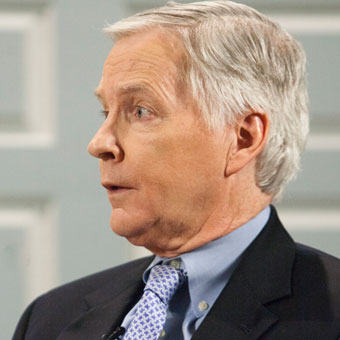 Ambassador
Ambassador 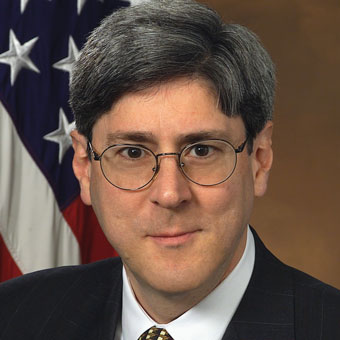 Douglas Feith
Douglas Feith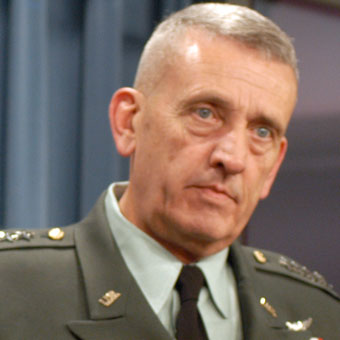 General
General 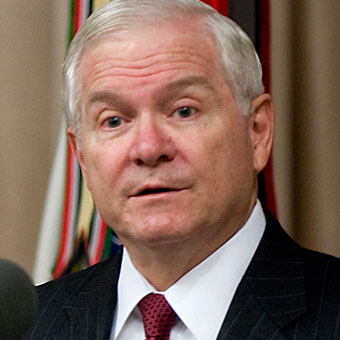 Secretary
Secretary 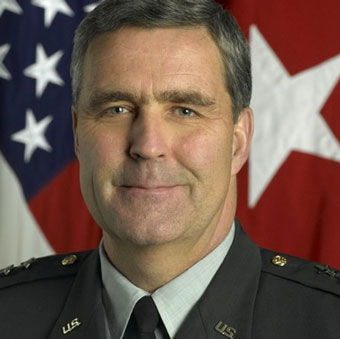 Lt. General
Lt. General 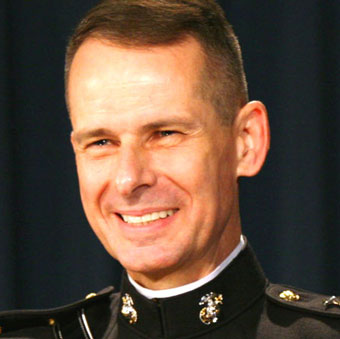 General
General